Who is Susan Butler?
Driven by a Love of Community & Music
Susan Butler Gives of Herself by Judy Bowman
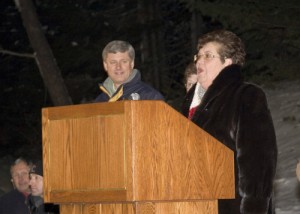 Listen to the words of Susan Butler’s song “Mystical Magical Mir-amichi” and you will hear the voice of a woman expressing love and a true connection to the river, landscape and people of her community. For her the Miramichi River “has a magic and mystique that makes you feel special and close to it. Close to the surrounding area, the woods, and to our heritage of songs about lumbering and fishing and heartbreak. There is just something . . . I know what it is and others know what it is, but it is hard to put it in writing. I guess I did with the song. I spoke about the water boats and how people come from near and far, and they always want to come home.”
Listen to the words of Susan Butler’s song “Mystical Magical Mir-amichi” and you will hear the voice of a woman expressing love and a true connection to the river, landscape and people of her community. For her the Miramichi River “has a magic and mystique that makes you feel special and close to it. Close to the surrounding area, the woods, and to our heritage of songs about lumbering and fishing and heartbreak. There is just something . . . I know what it is and others know what it is, but it is hard to put it in writing. I guess I did with the song. I spoke about the water boats and how people come from near and far, and they always want to come home.”
This love of community and music has been an integral part of Susan’s life. She’s devoted countless hours of her talent and fundraising abilities to benefit Mir-amichiers and those far beyond our region.
On February 9, 2007, Susan Butler received the Order of Canada in a ceremony in Ottawa. With this award, the highest Canada offers her citizens, Susan was recognized for her 25 years of service as director of the Miramichi Folksong Festival, her fundraising initiatives which have raised hundreds of thousands of dollars both locally and internationally, including the Canadian Red Cross, local high schools, and the Alzheimer’s Society. In two eight-hour non-stop music concerts, Susan raised money for victims of war in Kosovo, and $20,000 for hurricane relief in the aftermath of Katrina in the southern United States.
Despite concern about the weather, Susan, her husband Jack, daughters Kathleen and Shannon and sister-in-law Mary Smith arrived at the Governor General’s residence, Rideau Hall, for the ceremony. Her family have been her biggest supporters through the joyous occasions and through times of turmoil. “Jack is the type of person who has always helped me step out from the shadows and encouraged me to pursue my talents. We’ve done this for each other in our 34 years of marriage (35 in September).”
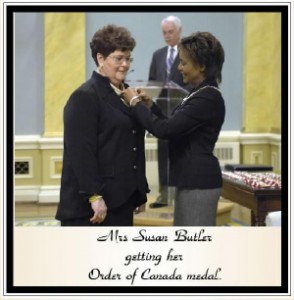 As her Excellency the Right Honourable Michaëlle Jean, Governor General of Canada, pinned on the medal, she asked Susan in an undertone if she could sing unaccompanied. Susan recalls chuckling to herself, and thinking of the training including a cappella singing she received from Sister Claire Maureen at St. Mary’s High School and just how handy those lessons had been. “Dr. Louise Manny of the Folksong Festival would never allow a musical instrument in the building and everything had to be sung a cappella. I auditioned by phone for Allan Mills and sang ‘June Bee,’ a selection written by a distant relative.”
As her Excellency the Right Honourable Michaëlle Jean, Governor General of Canada, pinned on the medal, she asked Susan in an undertone if she could sing unaccompanied. Susan recalls chuckling to herself, and thinking of the training including a cappella singing she received from Sister Claire Maureen at St. Mary’s High School and just how handy those lessons had been. “Dr. Louise Manny of the Folksong Festival would never allow a musical instrument in the building and everything had to be sung a cappella. I auditioned by phone for Allan Mills and sang ‘June Bee,’ a selection written by a distant relative.”
When she answered the Governor General, Susan was pleased to confirm that she could indeed sing unaccompanied and performed her own composition, “Proud to be Canadian,” to a very enthusiastic audience at the gala dinner after the ceremony.
Daughter of Cecilia Marie Mills of Tracadie and Charles Michael Butler, Susan was brought up in rural Miramichi on the Chaplin Island Road. "A friend of the family had visited a place called Avoka in Ireland, Avoka meaning a meeting of the waters. When he came to visit us, he noticed a similarity between our home and the place in Ireland. He suggested we name our home Avoka and the name stuck."
She credits her mother for her interest in music. Mario Lanza was also a huge influence. “On Saturday afternoons when the family would go to town, I’d stay home and put Mario Lanza albums on up to full tilt and sing along. I listened to Catherine McKinnon who was big at that time and I like good country music—Jim Reeves and Patsy Cline, Gordon Lightfoot—and other genres, Pavarotti, and Wilf Carter.”
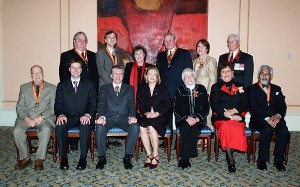
Susan Butler received the Order of NB in 2007
At St. Mary’s High School in Newcastle, she received formal training in voice and piano. “I didn’t accomplish with the piano what I did with voice. I use the piano to learn a piece of music.”
Like many teens then and now, Susan suffered from an inferiority complex. “People laugh when I say this, but it was true.” Even at the Ottawa awards ceremony she heard an echo of her younger self when she saw the list of award recipients. “I saw doctors, lawyers, scientists, and then there was me. I felt a little out of my league. I was overwhelmed with emotion. But then, I felt as if someone had placed a hand on my shoulder and a voice was encouraging me, ‘You can do this.’ It could have been my dad. By the time my name was called, I felt relaxed. My Miramichi was rooting for me and I wasn’t going to let them down.”
As a teenager, her first confidence boost came in an unexpected manner. After travelling to Montreal for a wedding, she heard the soloist was taken sick. “My aunt told them that I could sing. My cousin said, ‘What have we got to lose?’ How encouraging. At the church I found a wedding folio and picked out three pieces. The pianist played and I sang them and again at the wedding. Later the priest came over to me and asked if I was going to be in church on Sunday, he wanted me to sing. I had never considered myself a singer. My sister Mary has a beautiful voice and I considered her the singer of the family even though I had been told by teachers that our family had more than one singer. I never looked back from that moment on.”
Susan has eight recordings to her credit. The first came about in 1987 when George Petty, the CEO of Repap Enterprises, heard her sing her signature song “The Mystical Magical Miramichi.”
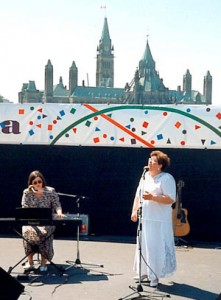
Susan sang "Remember Me" in Ottawa on Canada Day, 1994
“After he heard me he came over and asked me to record that song. He passed me his card and told me to call him in the morning. Well I didn’t know anything about recording music. I did my homework and acquired the information he needed and provided it. And he sent a cheque for the entire cost of the production.”
Since that recording, Susan has eight more to her credit. Petty flew her all over Canada and the United States to perform at special dinners and functions. When he died, Susan was asked to sing at his funeral. “It was humbling to think that my music had that much of an impact on him.”
Musically, Susan’s life has been very exciting. She organized and performed a tribute to the Westray miners in 1986, wrote and performed the theme song for the Special Olympics in 1993, hosted a BT Voices for Hospices in 2000 where choirs performed internationally and the funds were donated to palliative care units in hospitals.
“I had the privilege of singing in Ottawa on Canada Day in July 1994. The National Alzheimer’s Association asked me to be part of a candlelight ceremony on Parliament Hill. That was a very moving event for me. There were hundreds of people holding hands as I sang ‘Remember me.’
“The music really allows me to fly in some ways and express myself. When you stand on the stage and get a reaction from your audience, it is actually humbling and overwhelming at times to think a song can have an impact on a person.”
Along with the high point of the Order of Canada, this year marks the 50th anniversary of the Miramichi Folksong Festival and Susan celebrates 25 years as director. Her interest in folksong reaches back to childhood. “On Sunday afternoon the Butler family had a tradition. We went to mass, came home, had something to eat and HAD to go to bed. That was a no-no to the children but we had to do what we were told. We never slept. We got up in time to listen to Dr. Louise Manny’s radio program that was on Sunday afternoon. And let me tell you the first time I heard it I thought, ‘What a racket!’ For a trained ear it was very hard to hear. I remember my dad telling me not to be a snob, ‘Listen to those words, that’s history.’ And I did start to listen to those words and especially songs of the Miramichi Fire. They were so realistic you could close your eyes and envision the fires burning a mile a minute and seeing women in Strawberry Marsh with their babies. ‘The Bluebird’ was a song I could relate to written by Martin Sullivan from Kouchibouguac. Today they would have called him a veterinarian but back then he was a cow doctor and he wrote this song about the boats that went up and down the river and supplied the ships with water.”
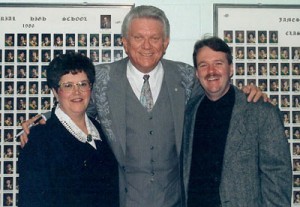
Susan Butler with Tommy Hunter and Brian Edwards
She’s seen many changes. “The hardest part of any change was watching the old folks die off. The worst experience I ever had was the night that Perley Hare sang and went over to the Black Horse and ordered a beer and by the time the waiter gave him the beer he was dead at the table. He sang the ‘Banks of the Clyde’ that night and he sang it like he had never sang it before.
“Over the years, I have gotten to know many wonderful people, the majority of which were a delight to work with. Frank Patterson came many times, as did Rita MacNeil, her first performance in New Brunswick. Unknown at her first visit, not a space was wasted for her second. She came with Men of the Deeps. We have a lot of the old music but more of the new. And when I took it over I began to mix the professionals and the amateurs. I say a professional is someone who gets paid more.” If that is the case, Susan is still an amateur. The only compensation she receives for her time and energy is satisfaction.
During the years Susan was directing the festival, she was employed fulltime as Director of Activities and Volunteer Services and as Chaplain at Mount Saint Joseph Nursing home. Her music was vital to her work. “People don’t realize how powerful a tool music is for people who are sick. It mellows them, soothes them and if they are agitated can change their behaviour instantly. It is a universal language and the most communicative tool we have in society today.
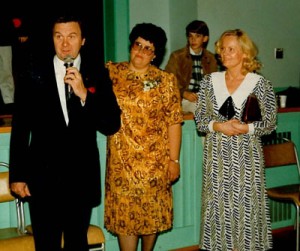
Susan with Irish Tenor, Frank Patterson, and his wife
“It was always my belief that the most important thing in a senior’s life, especially when they come into a nursing home, is that they are preparing for their last journey and spirituality plays a great role. I’ve seen people admitted that have never darkened the doorway of a church in their lives find comfort just sitting in a chapel. People who were incapacitated could manage to get in the elevator and up to the chapel—it just amazed me. And every time there was a church function, they were there. And if that can give them peace and hope, then that is fulfilling. I would often go to the bedside and read scripture to the residents. The staff used to laugh at me because I didn’t cancel the service if a priest or a minister couldn’t make it. They said, ‘Susan will put the collar on for the afternoon’ and I did and I felt so comfortable and I could wrap a 30 minute homily around three or four words. I had such a love of this work, that for 18 years, I gave up my Christmas Eve to have a Christmas mass with the residents. We’d have pictures under the Christmas tree and a lunch. There always had to be a lunch. I loved to cook and they loved to cook.”
What Susan describes as the biggest turmoil in her life occurred in January of 2003.
“My family was with me when the doctor came to the house to tell me I had cancer. For two days I stayed in denial and fought my inner feelings, then when it sinks in . . .
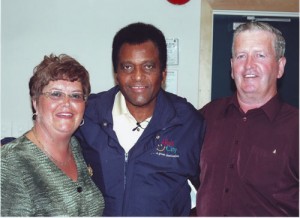
Susan Butler with Charlie Pride, one of the many famous performers she has brought to Miramichi.
“I remember one night being so hard. I was to have my surgery, the first week of February and I had a big dinner concert coming up the following week. Everything was organized. I even had the desserts made. I didn’t know what I was going to do. Then, it was just as if someone put a hand on my back and asked, ‘Are you going to let this get the better of you?’ And I thought, no. I’ve got too much living to do. I’ve got too many things to accomplish to put up with this kind of foolishness.
“I got out of the hospital on a Wednesday, the concert was scheduled for the Saturday night. I asked the doctor if I could sing at the concert. He asked if I thought I could sing. I told him I wouldn’t ask if I didn’t think I could. My husband was all upset with me and told me I’m only giving you 15 minutes up there. I walked out on the stage to a standing ovation and I had to tell the audience to stop, they were cutting into my time.”
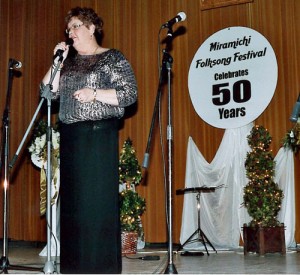
Susan performing at the 50th Anniversary of the Miramichi Folksong Festival
Two months after her original surgery, complications set in. After a second surgery, it was a month and a half before she recovered. “It was the only time in my life that I thought I was losing ground. Coming through the ordeal was an eye-opener for me.”
Within two years Susan retired from her job to “stop and smell the roses.”
“I didn’t look back. I had 38 great years there and was satisfied with what I had accomplished. Now, I don’t know how I managed to do all that I did. My husband is always saying I don’t know how to relax but I have ways. Choir practice is my relaxation . . . I have one confession: I watch 2 soaps. Everyday I ask myself why I watch them but then I show up to see what Samantha and the other characters are up to. I listen to CBC continuously. I think it connects all Canadians to the world.
“For me it is important to feel that I can accomplish something everyday. I’m very organized and not a procrastinator. There have been challenges through the years especially when organizing the festival and fundraisers but I learned my leadership abilities from my father, Charles Michael Butler. My dad always told me to ‘do it and do it right or don’t do it at all.’”
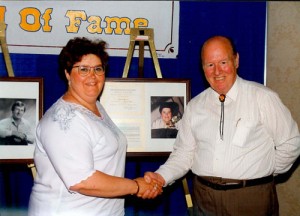 Currently, Susan is getting ready for the 50th anniversary of the Miramichi Folksong Festival. “When I stop and think back to that time, I could never have imagined that I would be directing the Miramichi Folksong Festival and now into my 25th year. I always said that when it stopped being fun, I’d retire. My big objective is to write a book on the festival 25th year as volunteer director.”
Currently, Susan is getting ready for the 50th anniversary of the Miramichi Folksong Festival. “When I stop and think back to that time, I could never have imagined that I would be directing the Miramichi Folksong Festival and now into my 25th year. I always said that when it stopped being fun, I’d retire. My big objective is to write a book on the festival 25th year as volunteer director.”
As for her medal, “I am still getting stopped and congratulated about it. I get tormented about when I’ll wear it. But that will be on Remembrance Day when I sing at the Cenotaph.”
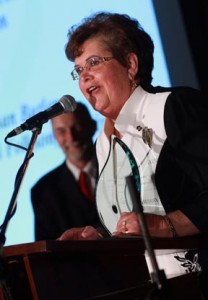 In the meantime Susan will do what she has always done, give of herself to this community and she will sing.
In the meantime Susan will do what she has always done, give of herself to this community and she will sing.
Written by Judy Bowman, this article was originally published in Bread 'n Molasses magazine in August 2007. Judy Bowman is a freelance writer in Miramichi and one of a few writers to be published in The Vagrant Revue of New Fiction. You can follow Judy's blog at http://www.judybowman.ca
As Susan prepared for the 55th Festival, she was honoured with a Dr.of Letters Degree from St. Thomas Univsersity on July 11, 2012 ,at their Summer Convocation in Fredericton. In her address to the convocation, Susan asked the graduates to give back to society, become a volunteer and be as enriched as she is.
August 15th Susan Received the Queen's Diamond Jubilee Medal

